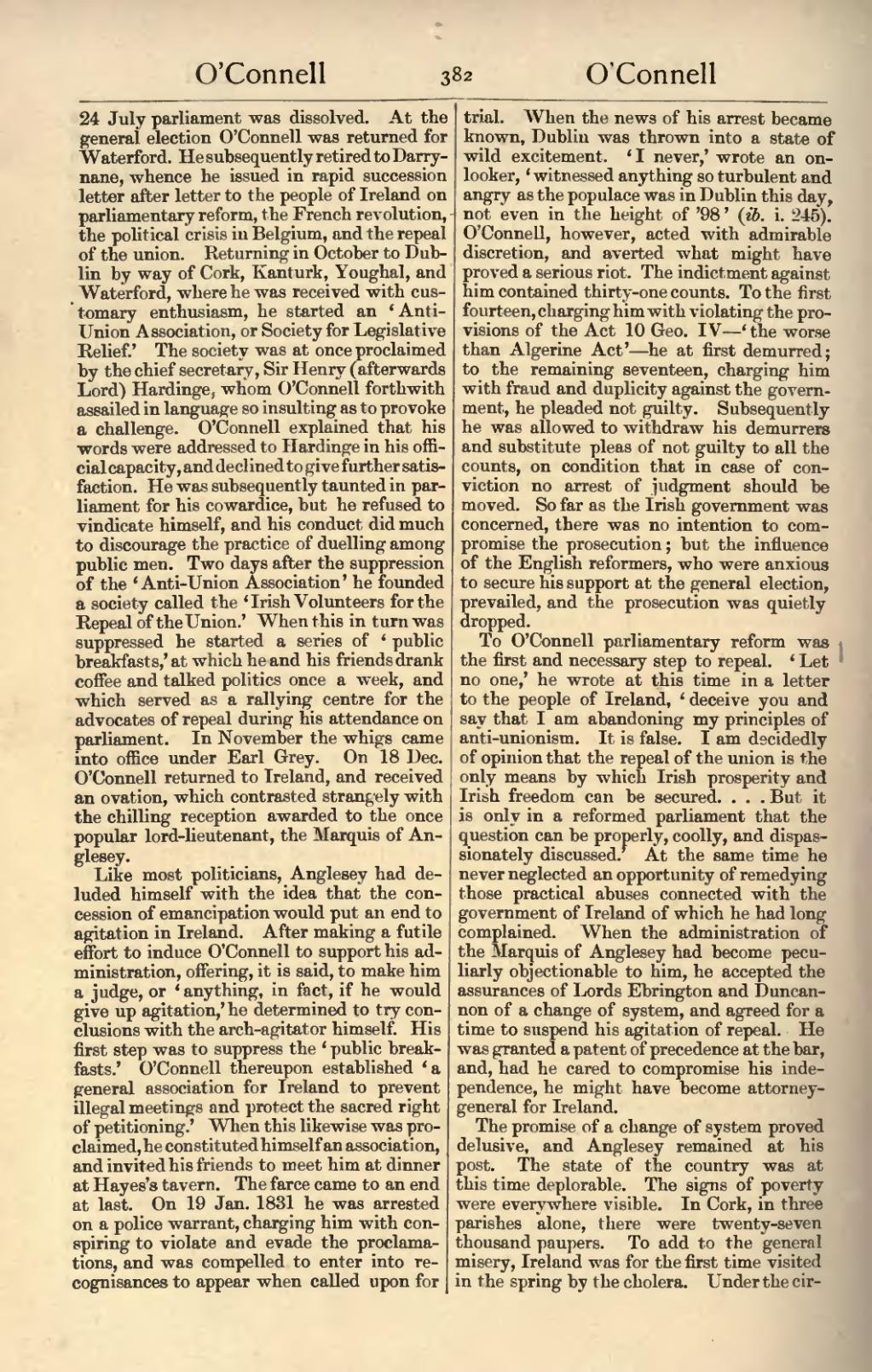24 July parliament was dissolved. At the general election O'Connell was returned for Waterford. He subsequently retired to Darrynane, whence he issued in rapid succession letter after letter to the people of Ireland on parliamentary reform, the French revolution, the political crisis in Belgium, and the repeal of the union. Returning in October to Dublin by way of Cork, Kanturk, Youghal, and Waterford, where he was received with customary enthusiasm, he started an ‘Anti-Union Association, or Society for Legislative Relief.’ The society was at once proclaimed by the chief secretary, Sir Henry (afterwards Lord) Hardinge, whom O'Connell forthwith assailed in language so insulting as to provoke a challenge. O'Connell explained that his words were addressed to Hardinge in his official capacity, and declined to give further satisfaction. He was subsequently taunted in parliament for his cowardice, but he refused to vindicate himself, and his conduct did much to discourage the practice of duelling among public men. Two days after the suppression of the ‘Anti-Union Association’ he founded a society called the ‘Irish Volunteers for the Repeal of the Union.’ When this in turn was suppressed he started a series of ‘public breakfasts,’ at which he and his friends drank coffee and talked politics once a week, and which served as a rallying centre for the advocates of repeal during his attendance on parliament. In November the whigs came into office under Earl Grey. On 18 Dec. O'Connell returned to Ireland, and received an ovation, which contrasted strangely with the chilling reception awarded to the once popular lord-lieutenant, the Marquis of Anglesey.
Like most politicians, Anglesey had deluded himself with the idea that the concession of emancipation would put an end to agitation in Ireland. After making a futile effort to induce O'Connell to support his administration, offering, it is said, to make him a judge, or ‘anything, in fact, if he would give up agitation,’ he determined to try conclusions with the arch-agitator himself. His first step was to suppress the ‘public breakfasts.’ O'Connell thereupon established ‘a general association for Ireland to prevent illegal meetings and protect the sacred right of petitioning.’ When this likewise was proclaimed, he constituted himself an association, and invited his friends to meet him at dinner at Hayes's tavern. The farce came to an end at last. On 19 Jan. 1831 he was arrested on a police warrant, charging him with conspiring to violate and evade the proclamations, and was compelled to enter into recognisances to appear when called upon for trial. When the news of his arrest became known, Dublin was thrown into a state of wild excitement. ‘I never,’ wrote an onlooker, ‘witnessed anything so turbulent and angry as the populace was in Dublin this day, not even in the height of '98’ (ib. i. 245). O'Connell, however, acted with admirable discretion, and averted what might have proved a serious riot. The indictment against him contained thirty-one counts. To the first fourteen, charging him with violating the provisions of the Act 10 Geo. IV—‘the worse than Algerine Act’—he at first demurred; to the remaining seventeen, charging him with fraud and duplicity against the government, he pleaded not guilty. Subsequently he was allowed to withdraw his demurrers and substitute pleas of not guilty to all the counts, on condition that in case of conviction no arrest of judgment should be moved. So far as the Irish government was concerned, there was no intention to compromise the prosecution; but the influence of the English reformers, who were anxious to secure his support at the general election, prevailed, and the prosecution was quietly dropped.
To O'Connell parliamentary reform was the first and necessary step to repeal. ‘Let no one,’ he wrote at this time in a letter to the people of Ireland, ‘deceive you and say that I am abandoning my principles of anti-unionism. It is false. I am decidedly of opinion that the repeal of the union is the only means by which Irish prosperity and Irish freedom can be secured. … But it is only in a reformed parliament that the question can be properly, coolly, and dispassionately discussed.’ At the same time he never neglected an opportunity of remedying those practical abuses connected with the government of Ireland of which he had long complained. When the administration of the Marquis of Anglesey had become peculiarly objectionable to him, he accepted the assurances of Lords Ebrington and Duncannon of a change of system, and agreed for a time to suspend his agitation of repeal. He was granted a patent of precedence at the bar, and, had he cared to compromise his independence, he might have become attorney-general for Ireland.
The promise of a change of system proved delusive, and Anglesey remained at his post. The state of the country was at this time deplorable. The signs of poverty were everywhere visible. In Cork, in three parishes alone, there were twenty-seven thousand paupers. To add to the general misery, Ireland was for the first time visited in the spring by the cholera. Under the cir-
